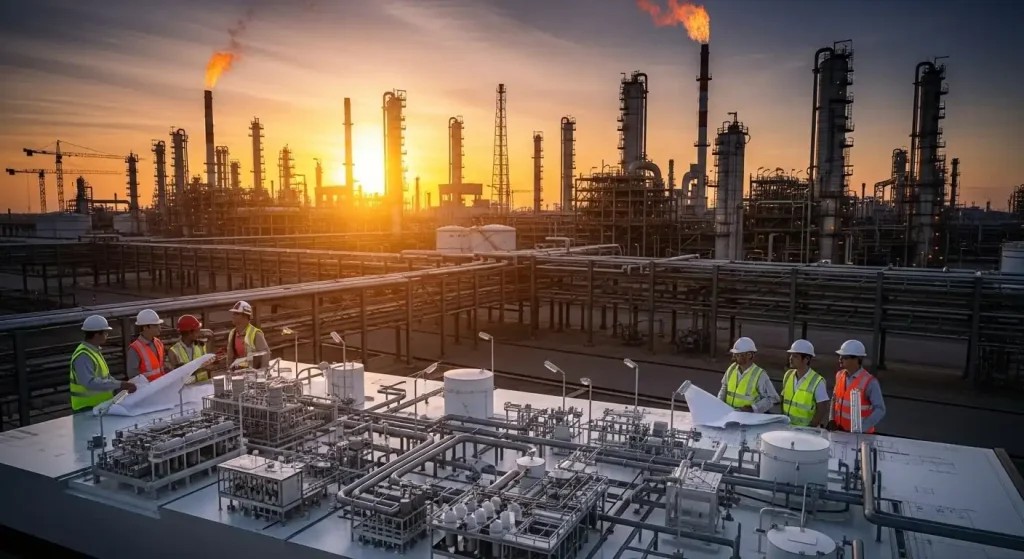
## The Unsung Hero of Energy: Understanding Oil and Gas Metering Systems
In the complex world of oil and gas production and distribution, one critical component often goes unnoticed: the metering system. These systems are the silent guardians of accuracy, ensuring fair transactions, efficient operations, and regulatory compliance throughout the entire lifecycle of oil and gas. From the wellhead to the consumer, metering systems play a vital role in quantifying the flow and characteristics of these valuable resources.
**What is an Oil and Gas Metering System?**
At its core, an oil and gas metering system is a collection of interconnected instruments and devices designed to accurately measure the flow rate, volume, and properties of hydrocarbons. These systems can range from simple single-phase meters to complex multi-phase systems capable of handling mixtures of oil, gas, and water.
**Key Components of a Metering System:**
While specific components vary depending on the application, a typical metering system includes:
* **Flow Meter:** The heart of the system, responsible for measuring the volume or mass flow rate of the fluid. Common types include:
* **Differential Pressure (DP) Meters:** Rely on measuring the pressure drop across a restriction (e.g., orifice plate, venturi).
* **Turbine Meters:** Utilize a rotating turbine to measure the flow velocity.
* **Positive Displacement (PD) Meters:** Measure flow by capturing and counting fixed volumes of fluid.
* **Ultrasonic Meters:** Employ sound waves to determine flow velocity.
* **Coriolis Meters:** Directly measure mass flow rate based on the Coriolis effect.
* **Transmitter:** Converts the flow meter’s signal into a standard electrical signal for transmission to a control system.
* **Temperature and Pressure Sensors:** Provide data for correcting flow measurements for variations in fluid density and compressibility.
* **Flow Computer:** Processes the raw data from the flow meter, temperature, and pressure sensors to calculate the compensated volume or mass flow.
* **Sampling System:** Collects representative samples of the fluid for composition analysis.
* **Instrumentation and Controls:** Includes valves, regulators, and control panels for managing the flow and operation of the system.
* **Proving System:** Used to verify the accuracy of the metering system through calibration and comparison against a known standard.
**Why are Metering Systems Important?**
The accuracy and reliability of oil and gas metering systems are paramount for several reasons:
* **Fiscal Measurement:** Accurate metering ensures fair and transparent transactions between buyers and sellers, preventing financial disputes and maximizing revenue.
* **Inventory Management:** Precise measurement allows for accurate tracking of oil and gas reserves and production, facilitating efficient inventory control and resource management.
* **Process Optimization:** Metering data provides valuable insights into the performance of production and distribution systems, enabling operators to optimize processes, identify inefficiencies, and reduce losses.
* **Regulatory Compliance:** Regulatory agencies worldwide require accurate measurement and reporting of oil and gas production and transportation, ensuring compliance with environmental regulations and tax obligations.
* **Leak Detection:** Sophisticated metering systems can detect subtle changes in flow rates, providing early warning signs of leaks and preventing environmental damage.
**Challenges and Advancements in Metering Technology:**
The oil and gas industry faces constant challenges, including increasingly complex fluid compositions, demanding operating conditions, and stringent accuracy requirements. To address these challenges, metering technology is continuously evolving:
* **Multi-Phase Flow Metering:** Accurately measuring the individual phases (oil, gas, and water) in a mixed flow is a complex challenge. Advanced multi-phase flow meters utilize sophisticated algorithms and sensors to provide accurate measurements.
* **Improved Accuracy and Reliability:** Ongoing research and development efforts are focused on improving the accuracy, reliability, and robustness of metering systems.
* **Smart Metering and IoT Integration:** Integrating metering systems with the Internet of Things (IoT) enables remote monitoring, data analytics, and predictive maintenance, improving efficiency and reducing downtime.
* **Digital Transformation:** Embracing digital technologies like cloud computing, machine learning, and artificial intelligence is transforming metering operations, enabling real-time insights and improved decision-making.
**Conclusion:**
Oil and gas metering systems are the unsung heroes of the energy industry, providing the crucial foundation for accurate measurement, efficient operations, and fair transactions. As the industry continues to evolve, advancements in metering technology will play an increasingly vital role in optimizing resource management, ensuring regulatory compliance, and driving sustainable practices. By understanding the importance and intricacies of these systems, we can better appreciate their contribution to the reliable and responsible delivery of energy to the world.